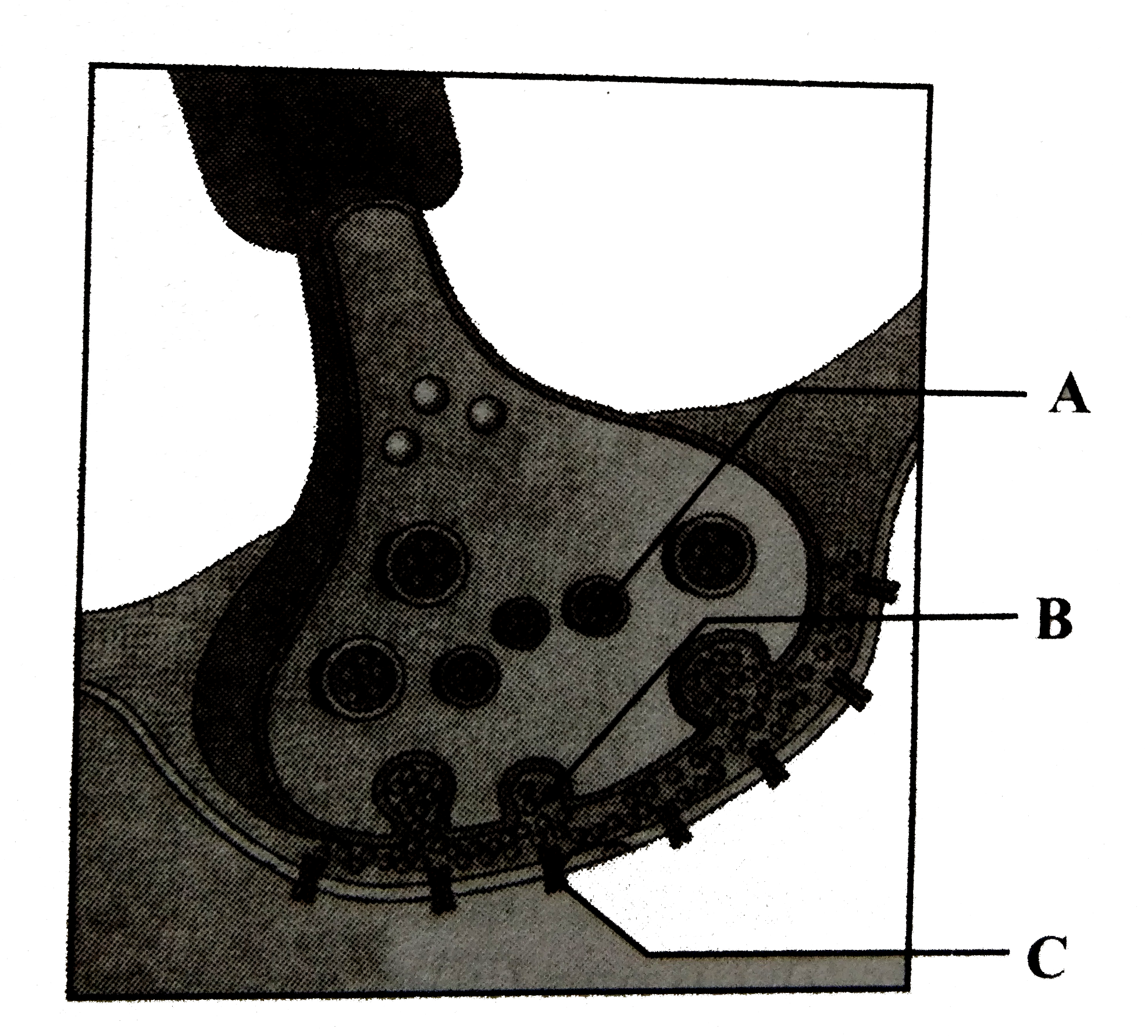string synaptic transmission of nerve impulse, neurotransmitter (p) is released from synptic vesicles by the section of ions (Q). Choose the correct P and Q
P = acetylcholine, Q=Ca++
P = acetylcholine, Q=Na+
P = GABA, Q=Na+
P = cholinesterase, Q=Ca++
The correct Answer is:A
Step by step video, text & image solution for string synaptic transmission of nerve impulse, neurotransmitter (p) is released from synptic vesicles by the section of ions (Q). Choose the correct P and Q by Biology experts to help you in doubts & scoring excellent marks in Class 11 exams.
Updated on:21/07/2023Topper's Solved these Questions
- NEURAL CONTROL AND COORDINATIONBOOK - ERRORLESS CHAPTER - NEURAL CONTROL AND COORDINATIONEXERCISE - Assertion and Reason
17 Videos
- MORPHOLOGY OF FLOWERING PLANTSBOOK - ERRORLESS CHAPTER - MORPHOLOGY OF FLOWERING PLANTSEXERCISE - Morphology Of Flowering Plants
613 Videos
- PHOTOSYNTHESIS IN HIGHER PLANTSBOOK - ERRORLESS CHAPTER - PHOTOSYNTHESIS IN HIGHER PLANTSEXERCISE - Photosynthesis In Higher Plants
339 Videos
Similar Questions
Neurosecretion of neurotransmitter from the synaptic vesicles is triggered by Ca++/Mg++ ions.
View SolutionWhich statements are incorrect for mechanism of nerve impulse conduction along electrical junctions of nerous or electrical synapse?
i Nerve impulse flow directly from one neuron to other across the synapses in electrical synapses
ii. Transmission of an impulse across electrical synapses is very similar to impulse conduction along a single axon
iii. Impulse transmission across an elecetrical synapse is always faster than that across a chemical synapse.
iv. Electrical synapses are rare in our system
v. At an electrical synapse, the membranes of the pre and post-synaptic neurous are separated by a fluid-filled space called synaptic cleft is thick.
vi. Chemicals called neurotransmitters are involved in the transmission of impulses at this synapse
View Solution
Knowledge Check
During transmission of nerve impulse, the released neurotransmitter bind to their specific receptors, present on the
APre-synaptic membraneBPost-synaptic membraneCBoth A and BDSynaptic vesiclesA list of events occurring in the transmission of nerve impulse across the synapse is given below in a random order
(i)Opening of specific ion channels allows the entry of ions, a new action potential is generated in the post-synaptic neuron.
(ii)Neurotransmitter binds to the receptor on post synaptic membrane.
(iii)Synaptic vesicle fuses with pre-synaptic membrane, neurotransmitter release into synaptic cleft.
(iv)Depolarisation of pre-synaptic membrane.
(v)Arrival of action potential at axon terminal.
Which of the following options represents these events in a correct order ?A(v)→(iv)→(iii)→(ii)→(i)B(i)→(ii)→(iii)→(iv)→(v)C(i)→(ii)→(iv)→(iii)→(v)D(v)→(iv)→(iii)→(i)→(ii)Which option is correct for conduction of nerve impulse along chemical synapse?
i. At synapse, the membranes of the pre and postsynaptic neurons are separated by a fluid-filled space called synaptic cleft
ii. Chemicals called neurotransmitters are involved in the transmission of impulses at these synapses
iii. The axon terminals contain vesicles filled with these neurotransmitters
iv. When an impulse arrives at the axon terminal, synaptic vesicles release their neurotransmitters in the synaptic cleft.
v. The released neurotransmitters bind to their specific receptors, present on the pre-synaptic membrane.
vi. Opens ion channels allowing the entry of ions which can generate a new potential in the postsynaptic neuron
vii. The new potential developed is only excitatoryAi, ii, iii, iv, v and viiiBi, ii, iii, iv and viCi, iv, v, vi and viiDi, ii, iii, iv, v, vi and viii
Stimulus from the environment is detected by the nerve cells. The simulus acquired is transmitted in the from of electrical impulse. From the options given below choose the correct scheme showing the direction in which the nerve impulse travels. (Arrows shows the direction of impulse flow).
View SolutionThe given diagram shows axon terminal.Select the option that correctly matches the steps in transmission of impulses (list i-vii) with the labellings (A-C) in diagram.

(i)Chemicals called neurotransmitters are released in the synaptic cleft through ion channels.
(ii)When an impulse arrives at the axon terminal, it stimulates the movement of synaptic vesicles.
(iii)Neurotransmitters are endocytosed into the neurons.
(iv)The ions channels close with the binding of neurotransmitters to their specific receptors vesicles.
(v)Synaptic vesicles move towards the membrane where they fuse with the plasma membrane.
(vi)Neurotransmitters are released in the synaptic cleft.
(vii)The released transmitters bind to their specific receptors on post-synaptic membrane
View SolutionAssertion. Transmission of a nerve impulse across a synape is brought about by a neurotransmitter.
Reason. A neurotransmitter is necessary to transmit a nerve impulse across a synapse because there is a small gap, the synaptic cleft, between the two neurons at the synapse.
View SolutionA : Transmission of the nerve impulse across a synapse is accomplished by neurotransmitters .
R : Transmission across a synapse usually requires neuro transmitters because there is space , i.e., synaptic cleft, that separates one neuron from another .
View SolutionRead the assertion and reson carefully to mark the correct option out of the options given below:
Assertion : Transmission of the nerve impulse across a synapse is accomplished by neurotransmitters.
Reason : Transmission across a synapse usually requires neurotransmitters because there is small space i.e. synaptic cleft, that seperates one neuron from another.
View Solution
